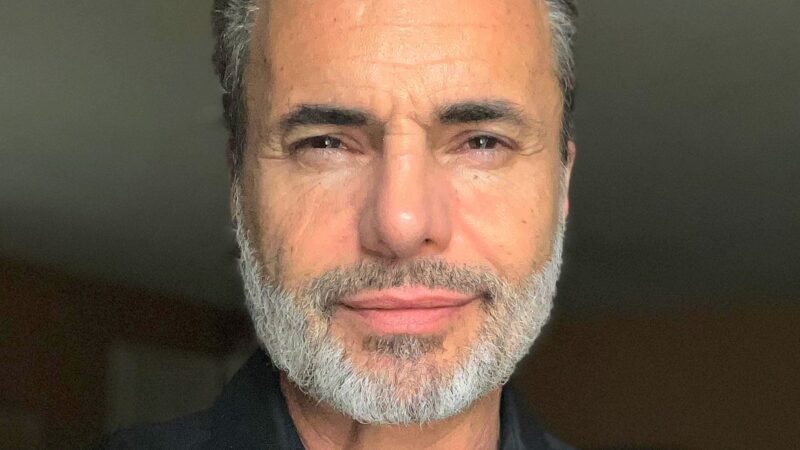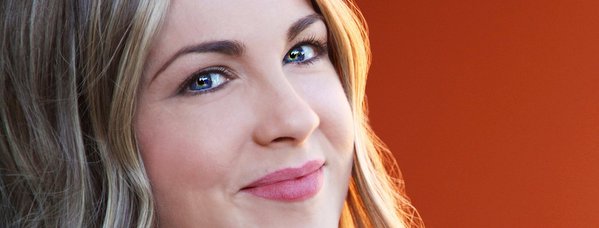
Carmel Savage was highly imaginative as a child and she owes her love of storytelling to my Mum. Carmel Savage grew up in a town where we only had two TV stations, so access to film/television content was limited and Mum would read to my sisters, brother & I religiously and eventually we could recite the words to every book in the house without ever taking them off the shelf. This definitely ignited my desire to perform, so I began speech & drama classes in primary school and continued studying drama and theatre subjects throughout high school and was awarded Dux of Theatre for my graduating year.
Did you study acting
After travelling the world, I began studying Drama at the University of Queensland before making the decision to focus on Film & Television Acting and completed a 2 year course at The Actor’s Workshop, the leading film/TV training organisation in Brisbane, Australia. The quality of the training I received was paramount, so I thoroughly researched all the institutions and acting courses available at the time. The Actor’s Workshop offered the highest standard of training and covered all aspects of film, television and theatre acting, providing me an invaluable foundation from which I continue to build on.
What acting technique do you use
Uta Hagen – the technique focuses on truth and realism of character. The method largely promotes self awareness in the actor – you have to be willing to break yourself down completely and know exactly who you are, as your own identity is pivotal in creating a genuine, honest character. The process involves practical exercises that explore the interaction between intellect, emotional experiences and the creative imagination. The Uta Hagen technique encourages you to “find yourself in a part, rather than lose yourself in a part”, allowing the actor to live through the circumstances of a scene and react in the moment, without premeditation, to create an authentic performance.
What wrong impressions do actors hold about acting
That talent is enough – it’s wrong to view yourself as only an artist and not as a business. As creative’s, we are so consumed by practicing and developing our craft (or product), that we become complacent about the business aspect of the industry. As an actor, you are your business. The heart of your business success lies in its marketing and if you’re not promoting your business properly, it will be difficult to make progress. A successful career in acting is not only about performance, but blending your artistic ability with smart business sense.
Do you take courses to improve your craft
Of course – I am of the belief that ‘luck is when preparation meets opportunity’, so I have continued improving my craft through maintenance classes at The Actor’s Workshop, completed several intensive training programs with industry professionals in Los Angeles, as well as short/weekend courses with national casting director’s throughout Australia. I also attend weekly scene classes with the gang at Scene-O-Rama in Brisbane. The group is comprised of actors, writers and directors, with varying levels of experience, who collaborate to develop screen performance skills. Scenes and character allocations are sent out a couple of days prior to class and it’s great to perform alongside so many talented people, who consistently challenge me and support my growth as an actor – it is the perfect weekly workout.
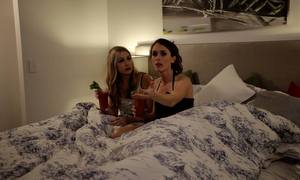 What acting books do you read
What acting books do you read
To be honest, I read more scripts than acting books, but I am often required to perform with an American accent and highly recommend “Practically Speaking” by Troy Mackinder. This book is a guide to learning the American accent like no other – the technique is simplified and (as the title suggests) practical, making the application to scripted dialogue uncomplicated. On set there are often last minute changes to text or improvisations mid-scene and the technique that Troy has implemented gives me complete confidence to remain in accent.
How do you keep fit as an actor
I work on auditions and submissions for upcoming projects and attend weekly scene classes – it is crucial to continue sharpening my skills. I make time each week to watch films and/or TV shows – not just for the entertainment value, but I think it’s important to know the current market and understand where I fit into it (create a wish list). I learn so much from examining other screen actor’s and often transcribe scenes that we can workshop in class. I also love a good networking event – it’s great to engage with the local filmmaking community, find about upcoming projects and surround myself with passionate and like-minded people. I do try to keep physically active too . . . but probably not as much as I should.
When you’re offered a role, what do you do next
I usually read the script once and make note of all the information relating to my character. Then I do a whole lot of homework – this involves exploring different character choices and breaking down the dialogue. Once I have finished this process, I learn the lines – I find it’s much easier to commit the lines to memory after adding meaning to the dialogue. I don’t always have time to rehearse scenes prior to shooting, but fortunately my husband is also an actor so he is able to run scenes with me from time to time and offers constructive feedback. Once I am on set, I let go of the work and focus on the present moment. Acting is reacting, so with each take comes a different performance and perspective – although my homework is essential to creating the character, I have to listen and be open to receiving from the other actor’s during a scene.
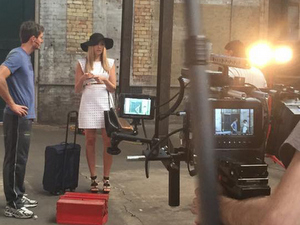 How do you take a character in a script to a honest, believable and breathing person
How do you take a character in a script to a honest, believable and breathing person
Homework! It’s quite an extensive process – I start with the character breakdown and then work through the preceding event and circumstances of each scene to determine the character’s state of mind, surroundings and if/how they impact the scene. I then break down the dialogue using justification and personalisation techniques – this is to create purpose in the words that are spoken, to establish how the character feels throughout the scene and their relationship to the other character’s. There are many more methods I apply to create a believable performance and I won’t list them all, but I find it essential to work on the inner monologue of the character – this delves into what the person is thinking/processing throughout the a scene. Some of the most powerful moments on screen happen when there is no dialogue, but only when the inner thoughts and feelings resonate the truth of the character, rather than the performer. Developing the inner monologue of the character is just as important to my process as breaking down the scripted dialogue.
How do you stay fresh on set
It is really dependent on the context of the scene, the role I am playing and the emotional state of the character. If the scene is quite lighthearted, I might run lines with the other actor’s or listen to music that I have selected for the character in between takes. For more intense scenes, I find a quiet space on set where I can sit by myself and connect to the emotion, focus on the moments directly preceding the scene and completely absorb the character.
Describe a memorable character you played
Most recently I played the role of Kelly Matric in the feature film “The Wrong Crowd” – Flying Low Productions, 2015 . Kelly is a wealthy hotel heiress who is famous for her party girl antics and has never worked a day in her life. The story revolves around the kidnapping of her husband, who is being held for ransom, while they are holidaying in Australia. The cast and crew were great to work with and I had a lot of fun with this character – her egocentric overtones, coupled with a penchant for social media, made on-set “selfies” a necessity between takes.
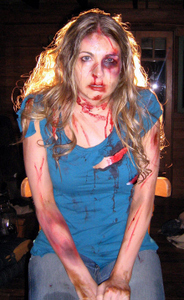 Explain one creative choice you took on set
Explain one creative choice you took on set
It’s difficult to think of only one, as all performance’s require creative contribution from the actor’s. It was great fun playing the role of the English Teacher on “Australiens” – a sci-fi comedy feature about aliens invading Australia. The part I played was minor, but the character was highly comical and the director allowed me free reign to just go for it. We played with several versions on set and the performance in the final edit was very over the top, but worked well in the genre.
What do you want most from a director
A clear vision, willingness to explore and confidence in my ability to perform. I believe effective communication is key to the success of a production and I respect brutal honesty.
What actors do you long to work with
I deeply respect the work of James Gandolfini and would have jumped at the opportunity to perform with him, but sadly he passed away in 2013 . There are loads of talented people I long to work with and at the moment Lena Dunham is top of the list.
Why
Lena Dunham is extraordinary – not only is she an accomplished actress, but also a gifted writer, producer, director and author. Lena is intelligent (far beyond her years) and possesses a flair for storytelling, creating characters that are refreshing and diverse. Her performances are inspired – she embodies the truth of the character, unashamedly, and demonstrates brilliant comedic timing. It’s easy to become cynical in this industry and I have a great admiration for people who create their own work . . . and conquer the Hollywood stereotype of women while they’re at it – a remarkable feat.
What advice would you give to actors
Respect the crew. As an actor, you are but a small part of a team of people working towards a common goal. The crew are the first on set in the morning and the last to leave, so always be kind. The way you conduct yourself on set is important – remember you are always auditioning for your next role.
Know your brand. First impressions are everything in this industry, so understand where you fit in the market – you only have a matter of minutes to reveal your character in an audition, make it count.
Continue refining your craft. Whether you enroll in full-time training or take weekend courses with industry professionals, remember that the more you practice, the better you become. There is no such thing as ‘overnight success’.
Don’t take rejection personally. You could nail an audition, but if you’re not what the casting department are looking for then you won’t book the role – it is not (always) a reflection of your performance. Learn to enjoy the audition process – it can be terrifying when you first start out, but remember that the casting director’s want you to do well and it may be your only opportunity to perform that particular day/week, so have fun! Let go of any expectation when you leave a casting and focus on the next project, as there is nothing more you can do.
Briefly write about your career
My body of work includes an abundance of short films, feature films, theatre productions, fashion shoots, corporate videos, TV shows/pilots, as well as starring in several national & international television commercials.
My film performances include the supporting role of Emma in “Still Waters”, a feature length horror, which was awarded Official Selection at the 2011 Cannes Palais des Festivals and received an international release in 2011.
November 2012 marked the highly anticipated release of “The Killage”, awarded ‘Best in Festival’ at Crystal Palace International Film Festival in London, in which I played the role of Hannah. Following the success of “The Killage”, I teamed up with Art Spear Entertainment again to perform several roles in their local skit-com TV series, “The Void”.
2014 was another busy year as I celebrated the release of sci-fi comedy feature “Australiens” where I play the role of English Teacher and filmed several projects, including action-adventure film “San Andreas” with Warner Bros Feature Productions. It was a great experience to work on a big budget studio film and allowed me to appreciate the intimacy of independent productions that are made on a shoestring.
I recently wrapped filming on the feature “The Wrong Crowd” with Flying Low Productions, as well as performing in numerous independent short films throughout the year. Each project provides a platform for the next, so it’s important for me to stay involved in the local short film industry – it allows me the opportunity to work on a variety of projects with minimal time restraints and is of benefit to up-and-coming filmmakers who are wanting to gain experience on set , or seek funding for larger projects.

